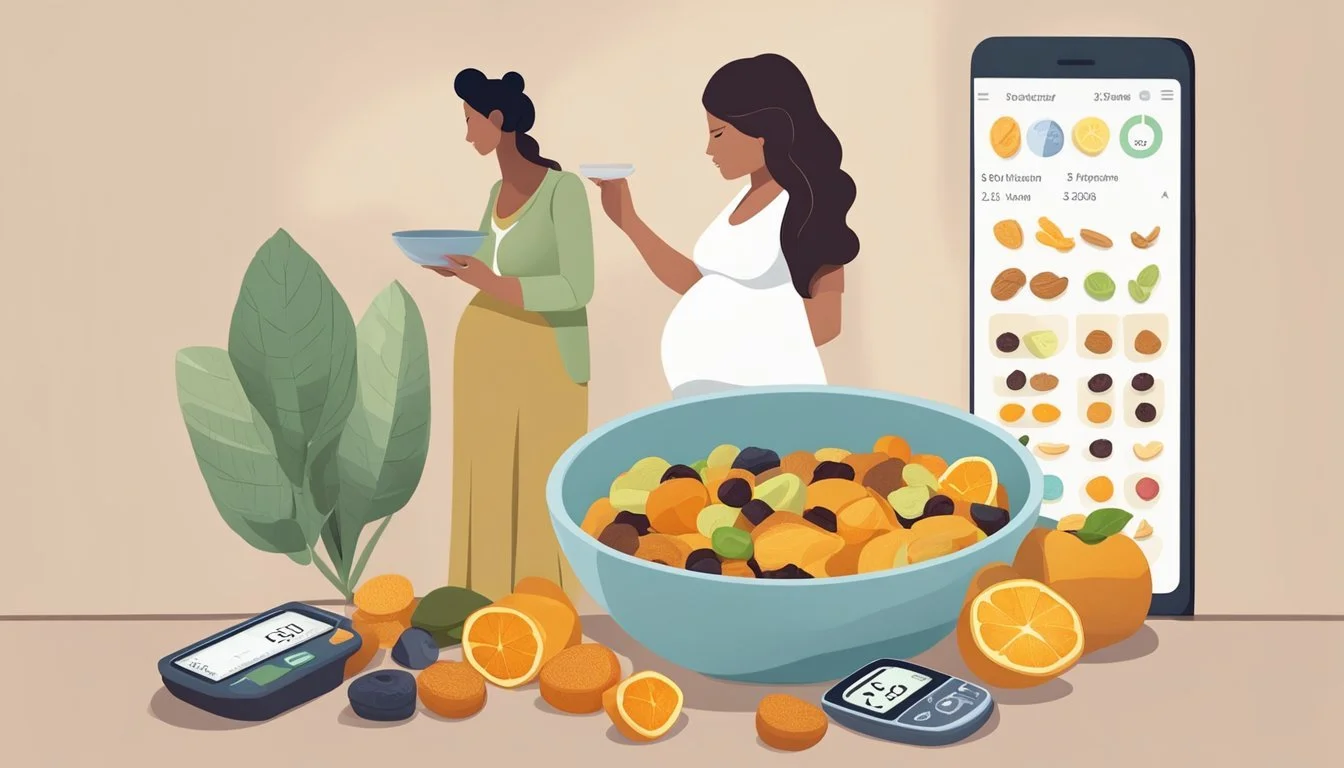Can I Eat Dried Fruits While Pregnant?
Safety and Nutritional Advice
Eating dried fruits during pregnancy can offer a bounty of nutrients to expecting mothers. They are a handy and nutritious alternative to fresh fruits, providing vitamins and minerals essential for both the mother and the developing baby. Loaded with dietary fibers, dried fruits such as figs, apricots, and dates can aid digestion and help tackle common pregnancy-related issues like constipation.
However, because dried fruits are more concentrated sources of sugar and calories than their fresh counterparts, moderation is key. Pregnant women should be cognizant of their intake to avoid excessive sugar consumption and potential gestational weight gain. It's also advisable to opt for varieties without added sugars or preservatives to maximize the health benefits.
Incorporating dried fruits into a balanced diet can be beneficial for pregnant women when done wisely. They not only provide energy but also contribute to the required intake of iron, potassium, and calcium. It is essential, though, to consider the overall diet and to consult with a healthcare provider to tailor nutritional needs to each individual pregnancy.
The Role of Dried Fruits in Pregnancy Nutrition
Incorporating dried fruits into a pregnancy diet can be beneficial due to their nutrient density. They offer important vitamins and minerals essential for both maternal health and fetal development. However, mindful consumption is necessary to avoid excessive sugar intake.
Key Nutrients and Vitamins
Dried fruits are concentrated sources of essential nutrients that support pregnancy health. They contain iron, which is vital for preventing anemia by aiding red blood cell production. Potassium in dried fruits helps maintain fluid balance and normal blood pressure levels. They are also rich in vitamins such as Vitamin A and Vitamin C, crucial for fetal development and immune function. Dried fruits like apricots and raisins provide folate, important for reducing the risk of neural tube defects, and calcium for building strong bones and teeth.
Iron: Prevents anemia
Potassium: Regulates blood pressure
Vitamin A: Important for vision and immune health
Vitamin C: Aids in tissue repair and immune defense
Folate: Essential for fetal neural development
Calcium: Strengthens bones and teeth
Natural Sugar Content and Moderation
Although dried fruits offer nutritional benefits, they also contain higher concentrations of natural sugar and calories compared to fresh fruits. The dehydration process removes water, making them energy-dense. Pregnant individuals should consume dried fruits in moderation to prevent excessive weight gain and manage blood sugar levels. Care should be taken to choose dried fruits without added sugar to avoid unnecessary calorie intake.
Natural sugar: Consume in moderation
Added sugar: Choose options without it for a healthier choice
Fiber, Digestion, and Constipation Relief
Fiber in dried fruits contributes to digestive health by promoting regular bowel movements, which can alleviate one of the common pregnancy discomforts: constipation. Additionally, the fiber in dried fruits helps to provide a feeling of fullness, which can aid in managing weight gain by reducing the risk of overeating. They should be consumed with adequate water to help absorb the fiber and support digestion.
Fiber: Aids in digestion and provides constipation relief
Water: Important for fiber function and overall hydration
Specific Dried Fruits and Their Benefits
Incorporating dried fruits into a pregnancy diet offers targeted nutritional advantages. They provide essential nutrients that contribute to the mother's and fetus's well-being.
Dried Apricots and Iron Intake
Dried apricots are a potent source of iron, a crucial element that prevents anemia by enhancing hemoglobin in the blood. They also offer a significant amount of dietary fiber, which aids in maintaining a healthy digestive system, and vitamin K, necessary for blood clotting and bone health.
Nutrients in Dried Apricots:
Iron: Essential for preventing anemia
Fiber: Supports digestion
Vitamin K: Aids in blood health and bone strength
Raisins and Potassium Levels
One finds potassium abundantly in raisins, an electrolyte which helps balance fluids and minerals in the body. This nutrient also plays a role in maintaining normal blood pressure levels. Rich in antioxidants, raisins can combat oxidative stress and provide additional calcium for bone health.
Key Benefits of Raisins:
Potassium: Regulates fluid balance and blood pressure
Antioxidants: Protects cells against damage
Calcium: Essential for bone strength
Dates for Natural Energy
Dates are dense in natural sugars, providing a quick source of energy, which can be beneficial for pregnant women. They're high in fiber, encouraging proper digestion and helping to prevent constipation. Additionally, dates contain magnesium, which supports muscular and nerve function, and antioxidants, which protect the body against oxidative stress.
Why Choose Dates:
Energy: Immediate source from natural sugars
Fiber: Prevents constipation
Magnesium: Promotes muscle and nerve health
Managing Blood Sugar and Weight
When pregnant, it’s crucial for a woman to manage her blood sugar levels and weight gain to maintain her health and the health of her unborn child. The consumption of dried fruits can affect both, due to their concentrated sugar content and higher caloric density compared to fresh fruits.
Gestational Diabetes Considerations
For a woman with gestational diabetes, monitoring blood sugar is essential. Dried fruits have a high natural sugar content, which can cause spikes in blood glucose levels. It's important that she consults with her healthcare provider to determine appropriate servings of dried fruits. Women with gestational diabetes may need to limit or avoid certain types of dried fruits to keep their blood sugar under control.
Portion Sizes and Caloric Intake
Dried fruits are nutrient-dense, and their smaller size can lead to consuming larger portions than intended, increasing calorie intake. During pregnancy, monitoring calorie consumption is important to support healthy weight gain. A serving size of dried fruit is typically half that of fresh fruit, about 1/4 cup. Pregnant women should aim for moderation to avoid excessive caloric intake from dried fruits, which can contribute to unnecessary weight gain.
Hydration and Water Content in Fruits
During pregnancy, staying hydrated is crucial for both the mother's and the baby’s health. Fresh fruits are rich in water content and offer superior hydration compared to their dried counterparts. It's important for expectant mothers to be mindful of the water content in the fruits they consume as it can significantly affect their hydration levels.
Effects of Reduced Water Content
Dried fruits have a significantly lower water content compared to fresh fruits. This reduction can lead to less effective hydration. For instance, a fresh apricot contains about 86% water, while dried apricots contain much less. Pregnancy requires increased fluid intake, and relying solely on dried fruits could lead to insufficient hydration. The water content in fresh fruits not only contributes to hydration but also aids in maintaining amniotic fluid levels and supporting fetal development.
Alternatives to Dried Fruits
While dried fruits are a concentrated source of nutrients, expectant mothers should consider fresh fruits or other alternatives that have higher water content to support their hydration needs. Some suitable alternatives include:
Fresh Fruits: Fresh fruits like watermelon, strawberries, and peaches are over 80% water and can directly contribute to daily water intake.
Juices and Smoothies: Freshly squeezed fruit juices and smoothies can be hydrating options, but they should be consumed without added sugars and in moderation due to their high natural sugar content.
Infused Waters: Adding slices of fruits such as lemon, lime, or cucumber to water can flavor the beverage naturally, encouraging more water consumption throughout the day.
By opting for these alternatives, pregnant women ensure they are consuming adequate water through their diet, aiding in overall hydration and well-being.
Incorporating Dried Fruits into a Pregnancy Diet
Dried fruits can be a healthy addition to a pregnancy diet, offering essential nutrients like iron, fiber, and antioxidants. They should, however, be consumed in moderation due to their high sugar content.
Creative Usage in Meals and Snacks
One can seamlessly integrate dried fruits into their diet by adding them to a variety of meals and snacks. For instance, raisins may be included in oatmeal or yogurt for a touch of sweetness along with a fiber boost. Dried apricots, which are high in iron, could be chopped and sprinkled over salads or blended into smoothies.
To increase protein intake, which is crucial during pregnancy, one might create a trail mix using dried fruits such as figs and prunes with a selection of nuts, including almonds, walnuts, pistachios, and cashews. This not only offers a nutritious snack but also combines fiber from dried fruits with protein and healthy fats from nuts.
Ensuring a Balanced Diet with Variety
Incorporating dried fruits into a pregnancy diet demands a balance with other food groups. It's vital to combine them with ample fresh fruits and vegetables to ensure a diverse intake of vitamins and minerals. Dried fruits should complement, not replace, these fresh options.
A balanced diet also includes varying protein sources, such as lean meats or legumes, alongside healthy fats. When choosing dried fruits, it's beneficial to look for those with no added sugars and to remember moderation to avoid excessive calorie intake.
Safety and Precautions
When considering dried fruits during pregnancy, safety and proper precautions are vital. Expectant mothers should be keenly aware of the choices they make between organic and conventional dried fruits and cognizant of the risks of allergic reactions and food safety.
Organic and Conventional Choices
Organic dried fruits are often recommended for pregnant women due to the lower levels of pesticide residues. They must adhere to strict agricultural standards that limit the use of synthetic pesticides and fertilizers. Conversely, conventional dried fruits may contain higher pesticide residues, but washing and handling them properly can mitigate some risks. Regardless of choice, it's crucial to ensure dried fruits are well-stored and without added sugars or preservatives, both of which could potentially affect maternal and fetal health.
Precautions for Selection and Consumption:
Choose sun-dried or naturally dried fruits over those with added sugars or preservatives.
Consume in moderation; a recommended limit is typically no more than 100 grams per day.
Verify organic certifications if opting for organic dried fruits to ensure they are compliant with safety standards.
Always check the expiry dates and store in airtight containers to maintain freshness and reduce exposure to bacteria.
Allergic Reactions and Food Safety
Pregnancy can sometimes alter a woman's immune system response, potentially heightening sensitivity or triggering new allergies. Therefore, introducing dried fruits should be done cautiously, especially if there is no prior dietary history with these foods. Signs of an allergic reaction can include nausea, rash, or difficulty breathing, and require immediate medical attention.
Strategies to Mitigate Allergic Reactions and Bacterial Risks:
Introduce new dried fruits slowly and in small quantities to monitor for any adverse reactions.
Ensure dried fruits are sourced from reputable suppliers with high standards for food safety.
Keep in mind that improper handling or storage of dried fruits can lead to bacterial contamination. Pregnant women should be extra careful as their immunity may be compromised during pregnancy.
In summary, while dried fruits can be safe and beneficial during pregnancy when eaten in moderation, one must take active steps to choose high-quality products and be cognizant of food safety to protect both maternal and fetal health.
Impact on Maternal and Fetal Health
Eating dried fruits during pregnancy can be beneficial due to their contribution to fetal development and the health benefits they offer to the mother. These foods are nutrient-dense and typically high in vitamins and minerals essential for both the mother and the growing fetus.
Contribution to Fetal Development
Dried fruits are rich in essential nutrients that support fetal development. For example, iron is crucial in preventing anemia and is important for the development of the fetal brain and immune system. Dried fruits like apricots, prunes, and raisins are good sources of iron. Omega-3 fatty acids, especially from dried walnuts, contribute to brain development, while vitamin E, found in almonds, provides antioxidant protection.
Iron: Vital in producing hemoglobin, reducing anemia risk.
Omega-3 fatty acids: Key for brain and retinal development.
Vitamin E: Supports the development of the fetal nervous system.
Benefits for the Mother's Health
Dried fruits offer substantial health benefits for pregnant mothers. They are a good source of fiber, which can alleviate pregnancy-related constipation. Vitamins B (particularly B6), C, and E found in dried fruits like dates or citrus peels help with tissue repair, immune system function, and skin health. Additionally, calcium in dried figs is important for bone health, and zinc supports the immune system and DNA synthesis.
Fiber: Eases digestion and reduces constipation.
Vitamin B: May alleviate nausea and support energy metabolism.
Calcium: Essential for building strong bones and teeth.
Zinc: Crucial for immune function and cellular growth.
Consuming dried fruits in moderation during pregnancy can provide these important nutrients, but it is also vital to maintain a balanced diet and consult with healthcare providers on appropriate dietary choices.
Concluding Remarks
In summary, dried fruits offer a convenient, nutrient-dense snack option for pregnant women. These fruits can supply essential nutrients which are pivotal for fetal development and the mother's health. Key nutrients found in dried fruits include:
Calcium: Essential for fetal bone development.
Iron: Helps in reducing the risk of anemia.
Potassium: Supports muscle and nerve function.
Fiber: Aids in digestive health and can mitigate constipation.
Vitamins: Especially Vitamin A and C, which are crucial for the baby’s immune system and overall health.
However, it is imperative for pregnant women to consume dried fruits in moderation to avoid excessive sugar intake and potential weight gain. Recommended portion sizes are typically around 1-2 servings per day.
Given the concentrated sugars in dried fruits, it is also critical to maintain oral hygiene to prevent dental issues. Selection should favor high-quality, organic options without added sugars or preservatives when available.
To conclude, with mindful selection and consumption, dried fruits can be a beneficial dietary addition during pregnancy. They provide energy, important vitamins, and minerals, while also catering to sweet cravings. Pregnant women should consult with their healthcare providers for personalized advice.




